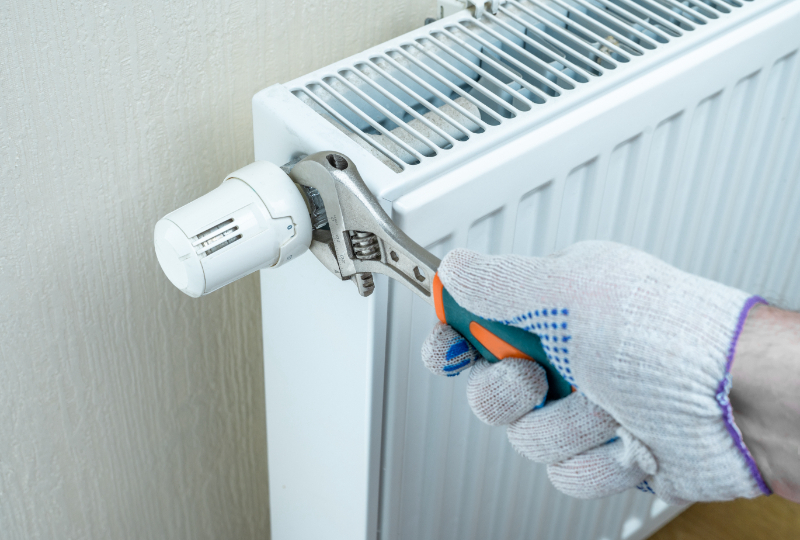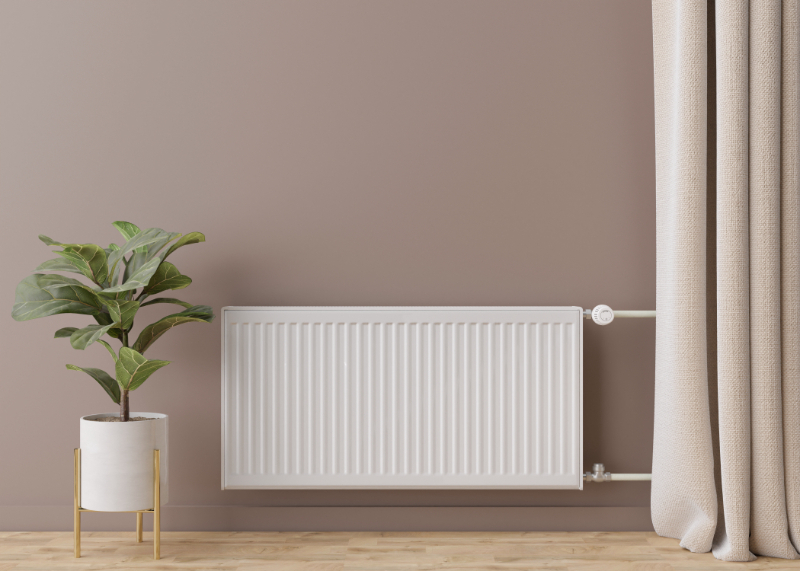When should you install a new radiator? We explore key considerations such as efficiency, performance, and home comfort. Learn when and how to upgrade your radiator system for optimal heating. Get started today!
Why would I need to replace a radiator?
There are several reasons why you might want to replace your radiator. Whether this is because of the quality of your existing installation or issues with your radiator units themselves. In the latter case, common issues might be uneven heat distribution or noticing your energy bills being higher than usual.
If you notice problems like this with your radiators, it's likely they need to be replaced. For the most part, you can leave your radiators to work away in the background. They are reliable heating systems, but this means that issues and inefficiencies develop slowly, making them harder to notice. Some of the most common reasons for replacing radiators include the following:
- Rust, corrosion and a build-up of sludge blocking the radiator that can't be fixed.
- Your existing radiators being inefficient compared to newer models.
- Needing to adhere to new quality or building safety standards.
- Purchasing a new home and wanting to update the fixtures.
- Improving the aesthetics of your radiators to match your room
- Wanting to improve efficiency for your heating and water.
What Causes A Radiator To Break?
When it comes to broken radiators, it's rarely an issue with the unit itself. In most cases, it will be a larger issue with your heating system.
Therefore, when a major issue occurs, it's usually a good idea to replace all the radiators in your property or the overall heating system.
Again, corrosion is one of the main issues most radiator systems encounter. This is where the uneven heating comes from.
As sludge builds up inside the radiators, you'll notice some areas of the radiator panel itself being colder than others where the blockages prevent hot water from circulating.

This can take years to notice, as the sludge gradually builds up over time. If you don't want to replace your radiators, you can have a professional heating engineer perform a power-flush to dislodge the build-up. Magnetic filters can also capture some of the rust, preventing it from collecting in your radiators.
With proper maintenance and regular servicing, you can keep your radiators working for years. Maintenance also helps your radiators hold on to more of their efficiency. Professional heating engineers can recommend the best ways to care for your radiators when you have them power flushed or when new ones are installed.
How to Prepare For New Radiators
There are a few things you need to do when installing new radiators besides ensuring they match your decor. Of course, if your home is relatively new, the radiator systems will likely be up-to-date. But if it isn't, you might be thinking of updating them for newer models. It's true that new radiators will be much more efficient than older models. However, many homeowners make the same mistake in purchasing them.
In most cases, people will buy more units that were previously installed, which isn't necessary given the efficiency advantage they provide. While it's a good idea for larger homes, there are system capabilities to consider. For example, you can buy more radiators than you had before, but if your boiler can't heat them all, you'll be putting more strain on it and reducing your overall efficiency. The same applies to those buying larger radiators with a bigger surface area than they previously had.
This will push the amount of heat and hot water your boiler needs to produce up, making it less efficient. Therefore, in some cases, getting new radiators also means getting a new boiler. Your boiler's capacity is probably the most important thing to consider when replacing your boilers. It's probably a good idea to do it anyway if your property is particularly old.
While new radiators will be more efficient, they rely on the power your boiler system provides. While installing a new boiler is expensive and time-consuming, it is well worth the hassle. Once complete, you can relax knowing you have a reliable heating system that will last for years to come. So long as you perform proper maintenance with regular servicing.

Benefits of a New Radiator
Older radiators can still function well enough to provide the heat you need. However, if they are particularly old, it's only a matter of time before issues arise.
Therefore, even if your radiators are working fine, it can still be prudent to have them replaced with newer models.
Homeowners can reap numerous benefits from having their radiators replaced. Any property can be improved with a new heating system, regardless of how old it is.
For example, replacing your radiators will make it easier for you to heat your home. This ease of heating not only makes you and your family more comfortable, but it can also cut down on your monthly energy bills.
Efficient heating systems won't need as much fuel to provide the heat you need, meaning when you turn yours on, it won't cost as much. Of course, the initial costs of replacing your radiators will be expensive, but in the long run it can ultimately save you money.
The costs of running an inefficient heating system can be significant compared to more efficient and newer radiators. Modern radiators also come with improved features, such as thermostatic controls to improve their function. Newer designs and colour options also mean you are more likely to find radiators that suit your interior decor compared to older models.
How Much Does Replacing a Radiator Cost?
The first thing to consider regarding replacement costs is your budget. This will be the main factor determining what you can achieve. Researching and working out what your essential needs are is the best way to start. Before you rush ahead and book a professional installation, you should familiarise yourself with the general costs involved in a radiator replacement.
We'll take you through the material costs as well as labour costs to give you a full picture. This way, you can know what to expect and avoid being overcharged. When replacing your radiator system, you can expect your costs to look something like this:
Small Units (400-600 BTUs)
Supplies: £20 - £40
Labour: £100 - £150
Time: 1-2 hours
Total: £120 - £190
Medium Units (600-900 BTUs)
Supplies: £40 - £90
Labour: £200 - £250
Time: 1-2 hours
Total: £240 - £330
Large Units (900-1,400 BTUs)
Supplies: £85 - £120
Labour: £250 - £300
Time: 2-3 hours
Total: £335 - £420
Improving your existing radiator system for more efficient models will improve your home's heating and reduce your monthly bills. Additionally, choosing a new style of radiator is a great way to improve your interior decor for relatively low costs.
As you can see, small radiator units for 400 - 600 BTUs will cost £120 - £190. This is fantastic value for money given the improved heating, reduced bills and aesthetic possibilities.
Even when looking at larger units, for £335 - £420, you can dramatically improve your home's heating. For a relatively affordable amount of money and a couple of hours out of your day, the benefits of new radiators are yours to enjoy. But these are just the basic costs for standard radiator replacements.
There are other options homeowners can choose from. For example, you may want to install a new radiator in a location where there wasn't one previously. This will naturally involve higher costs for labour and materials. In this case, your costs can be slightly different:
Small Units (400-600 BTUs)
Supplies: £20 - £40
Labour: £250 - £300
Time: 1-2 hours
Total: £270 - £340
Medium Units (600-900 BTUs)
Supplies: £40 - £80
Labour: £300 - £350
Time: 2-3 hours
Total: £340 - £430
Large Units (900-1,400 BTUs)
Supplies: £85 - £120
Labour: £350 - £400
Time: 3-4 hours
Total: £435 - £520
As a general rule, installing an extra radiator will cost roughly £100 more than replacing an existing one. This is mainly because of the increased labour costs. For a new radiator, you'll need to install new pipework to connect it to your boiler. This also means higher material costs for the extra pipes and solder.
Naturally, installing a new radiator will also take more time compared to simply replacing one. You should only have a Gas Safe registered heating engineer perform work on your boiler or radiators. These are the only professionals qualified to carry out this work.
Do you require radiator installation services in Leicestershire? We offer services to both domestic and commercial customers Uppingham, Oakham, Stamford, Peterborough and Rutland. Our charges are highly competitive and realistic. If you are experiencing problems with your central heating - Please contact us.

